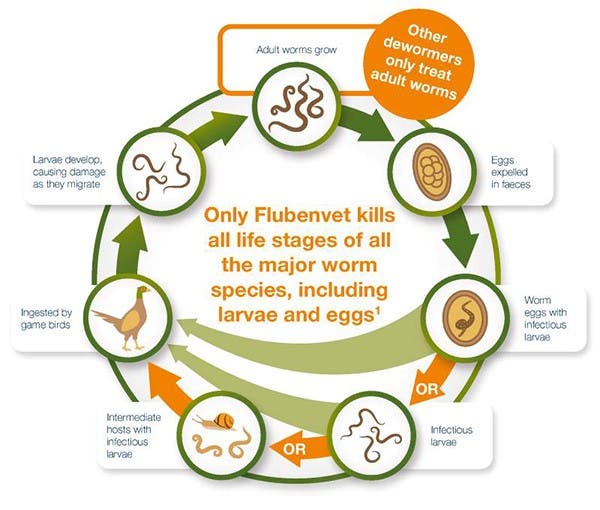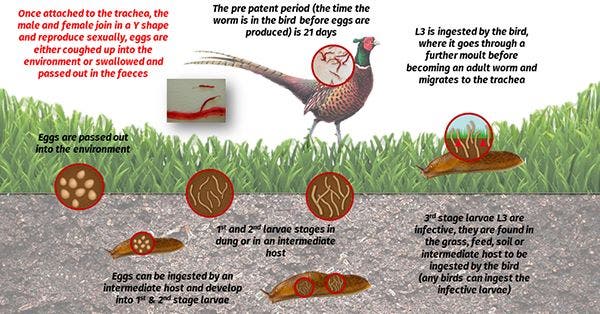About Flubenvet

Flubenvet remains the only dewormer licensed for the control of ALL the life stages of ALL the main species of parasitic worms1. This is critical for effective control because worm eggs far outnumber adults and can survive in the environment for months or, in some instances, over a year. This means viable eggs can still be present in the ground between seasons. Worm eggs are also able to resist destruction by many commonly used farm disinfectants. Therefore, it is important to ensure that laying and rearing pens are set up on clean ground and equipment is disinfected before use, to minimise the initial risk of exposure to high adult worm burdens in the area. Then, as soon as you bring in laying stock, providing medicated feed that includes Flubenvet will eliminate all life stages of the major worm species1.
Studies have found that all estates across the country are infected with worms, with young birds being particularly susceptible2. Gapeworms (Syngamus trachea) are arguably the most important species of worms that infect game birds as it is a major cause of death and respiratory infections in both pheasants and partridges. Gapeworms have a rapid lifecycle, once the birds ingest an infective egg, larva or earthworms containing larvae:
- In just 4-6 hours larvae can be found in the lungs after having burrowed through the gut wall into the blood stream, potentially causing lung damage
- 7 days later they can be found in the windpipe and have developed into adults, causing the bird to ‘gape’ or ‘snick’

For this reason gapeworm infection needs to be tightly controlled, with 3 weekly Flubenvet treatment advised to control their short lifecycle. Flubenvet’s active ingredient, flubendazole, simultaneously enters the worm through the mouth and skin or cuticle. It acts by binding to tubulin, the dimeric sub-unit protein of the microtubules. Flubendazole inhibits microtubular assembly in absorptive cells and causes an irreversible lytic degeneration of the cell, killing the parasite. Larval growth in developing worm eggs is also inhibited. Immature, fast-developing worms are particularly sensitive to flubendazole’s mode of action. Uniquely, Flubenvet is active against worm larvae and eggs. This means that immature worms are killed straight away, as well as any worm eggs that may be picked up preventing early damage, rather than being allowed to progress to adulthood, causing further damage as they progress through the mature stages.
Flubenvet’s performance spectrum vs available alternatives
- Flubenvet 5% SPC.
- Draycott, RA, Parish, DM, Woodburn, MI & Carroll, JP. Spring survey of the parasite Heterakis gallinarum in wild-living pheasants in Britain. Veterinary Record 2000; 147: 245–246.